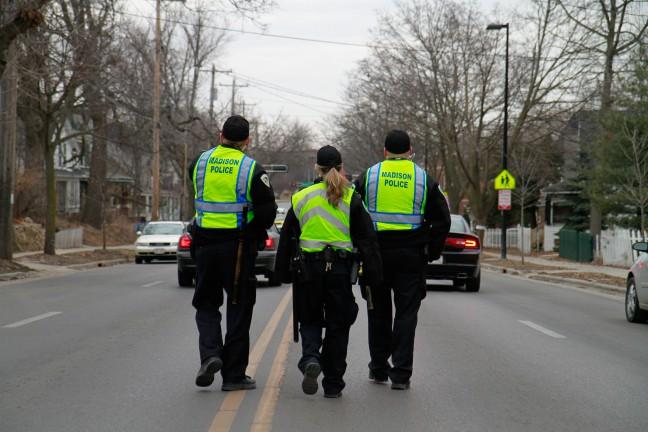In an effort to improve police-community relations, the Madison Police Department hosted a youth leadership event late last month.
The Police and Youth program, hosted on the north side of Madison, was a workshop created by the Zeidler Center to encourage casual and personal interaction between officers and residents.
MPD has launched several initiatives in the last year with funding from the “Safe and Thriving Communities” grant awarded to the department in 2017, according to Officer Dave Dexheimer.
Dexheimer said the funding from this grant has gone to community development spaces, such as the Kennedy Heights Community Center, the Madison Starlings Volleyball Club and the Vera Court Neighborhood Center.
The city allocated these funds to the Northside Safe and Thriving Community plan to improve police-community relations and reduce violent crimes on Madison’s north side, Dexheimer said. This specific plan and project runs in tandem with other community initiatives in Madison, such as “coffee with a cop.”
“One of the reasons [Zeidler’s program] fit so well with us is that the mission of the Madison Police Department is to actively look for ways to engage the community,” Dexheimer said.
The program made use of personal experiences and tried to increase trust levels between youth and police with facilitated communication, Dexheimer said.
The Zeidler Center recently expanded to Madison after finding success with their work in Milwaukee, according to the Zeidler Center’s associate director Julie De Brito.
De Brito said the program aims to get citizens involved by training them as communication facilitators and by serving their community through the creation of local partnerships.
“Success [in these programs] is measured by human interaction — having a look at the atmosphere in the room the first day you start YPI [Youth and Police Initiative] versus the last day of YPI,” De Brito said. “You can feel the discomfort in the room on the first day. Because participants, both youth and officers, are willing to lean into discomfort and get to know each other on a personal level, they are willing to lean into being vulnerable in front of each other.”
Officer Dexheimer said he also measured the success of Madison’s YPI program by sensing the initial discomfort of participants the first day, and comparing it to the open communication and established relationships seen on the last day.
Increasing the public’s trust in police requires a lot of systematic work, University of Wisconsin sociology professor Pamela Oliver said. There are structural reasons for the distrust that exists, she explained.
“The question is whether these kinds of ‘getting-to-know-you’ events can address the systemic issues,” Oliver said. “In an essay I wrote, I argued they are of limited use and don’t have a strong impact, especially if police officers in the department are behaving in trust-breaking ways.”
Oliver said that even if Madison’s police department treated everyone equitably, did not target people and did not engage in stop-and-frisk policing, such practices still exist in the larger society and would therefore still have an impact in Madison.
Oliver said the extent to which minorities in Madison believe they are being targeted by MPD plays a major role in this distrust.
“Maybe the best way to improve trust is to acknowledge there is distrust on both sides — accepting that this distrust has a basis in reality, that it’s not crazy and that it’s probably not going to go away just if everyone smiles at each other and asking if we can do something positive anyway,” Oliver said.
As Wisconsin diversity increases, education system still faces substantial racial disparity
Oliver said measuring the success of programs like this is difficult because crime and arrest rates can decrease for a variety of reasons. If arrest data for reasons that can be seen as discretionary to the police, like disorderly conduct, remain high, then it can be assumed that police are surveilling the community more, which can stir feelings of distrust, Oliver said.
Oliver said data is important in measuring the success of these programs, in addition to surveying community attitudes and behaviors. While the Zeidler Center and MPD have reported enjoying the success of the YPI program, both have other goals for improving these initiatives.
“[Another way] we are always making improvements in our program is [by asking] participants themselves how they felt about the program,” De Brito said. “We look at what participants liked the most and what they want to see changed … We want to make sure we are serving our participants the way they want to be served.”
MPD has participated in several projects with the Zeidler Center, including YPI and police-resident listening circles. Officer Dexheimer said he is hopeful MPD will keep working with the Zeidler center on these programs, and expand them across the city, rather than only having them on the north side.
DeBrito said Zeidler and MPD will be offering more programming over the next month and in the future, including another youth police event and similar programming in late March.


